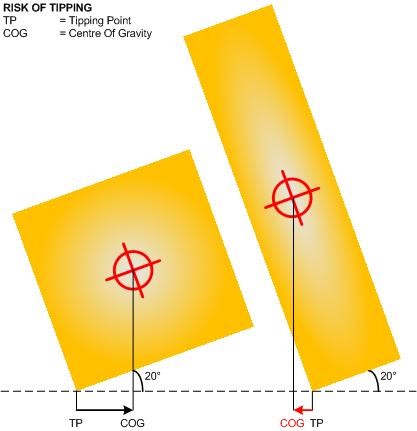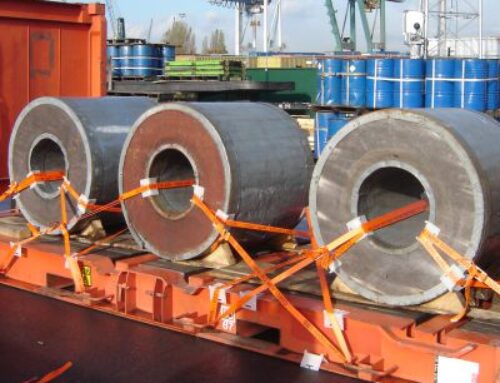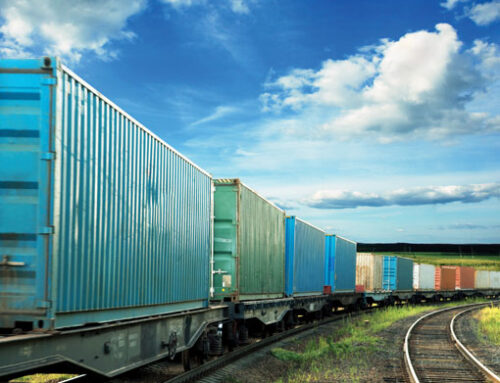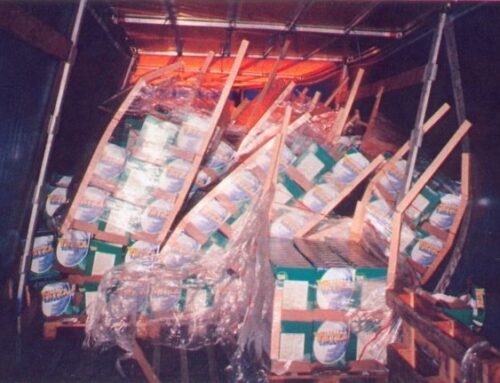Container Cargo Securing in a Nutshell – Part 2
Forces acting on cargo
In Part 1 of “Cargo securing in a nutshell” I discussed how forces act on cargo. If the cargo is not or not properly secured, these forces may cause the cargo to slide or tip.
The effect of forces that act on cargo is beautifully demonstrated in this 10-second video. The cargo in the video is not secured. When braking, the friction of the cargo towards the floor isn’t sufficient to prevent it from sliding. The IBC (Intermediate Bulk Container) also illustrates that cargo may tip. Let’s dig into “sliding” and “tipping” a bit deeper.
Sliding
A cargo that is not secured will shift when the forces as a result of acceleration, deceleration or change of direction are bigger than the frictional force between the cargo and the loading floor.
The magnitude of the frictional force depends on these forces caused by acceleration, deceleration and/or change in direction, on the gravitational force acting on the mass (weight) of the cargo and the material of which cargo and loading platform are made.
The moment at which the cargo starts to shift, however, is not dependent on the mass or weight of the cargo because the energy stored in a heavy object that moves (the potential energy) is larger than that of a light object.
At acceleration, deceleration or change of direction, the mass force is proportional to the weight of the cargo. A heavy and a light load will, therefore, start to move at the same time, as shown in this 20 second video:
After watching this video I am sure that you agree that the thought that “if an object is heavy enough it does not need to be secured” can, therefore, be thrown directly in the trash bin!
Tipping
An object will tip when the centre of gravity passes the tipping point of the object (see illustration).

Tipping is particularly a risk when the height/width or height/depth ratio of the cargo is relatively high, in other words when the centre of gravity is located at the top of the cargo. It is therefore important to pile light goods on top of heavy goods if possible. This seems obvious, but practice often shows otherwise.
Cargo must, therefore, be secured against sliding and tipping! Both effects can cause damage and serious injury either before, during or after transport:
- Personal injury, sometimes fatal, as a result of insufficient securing, should not be underestimated.
- Economic loss can be direct or indirect
-
- Cargo or transport unit may be damaged
- Fines for improperly secured cargos are high
-
- Improperly secured containers or flat racks may be rejected in the port and therefore not be loaded. In this case, you are often forced to depend on third parties that will secure your cargo properly, but you will pay the bill. If this isn’t an option, your cargo will suffer major delays simply because it will not be taken on board. As a result of that, your customer’s confidence will drop dramatically.
Correct securing of cargo is therefore essential. Partly through a jungle of laws, regulations, recommendations and well-intent advice, it can seem an impossible task. We can help you with this! Just get in touch with us for a free recommendation as to how you can secure your cargo. It will be our pleasure to assist!






